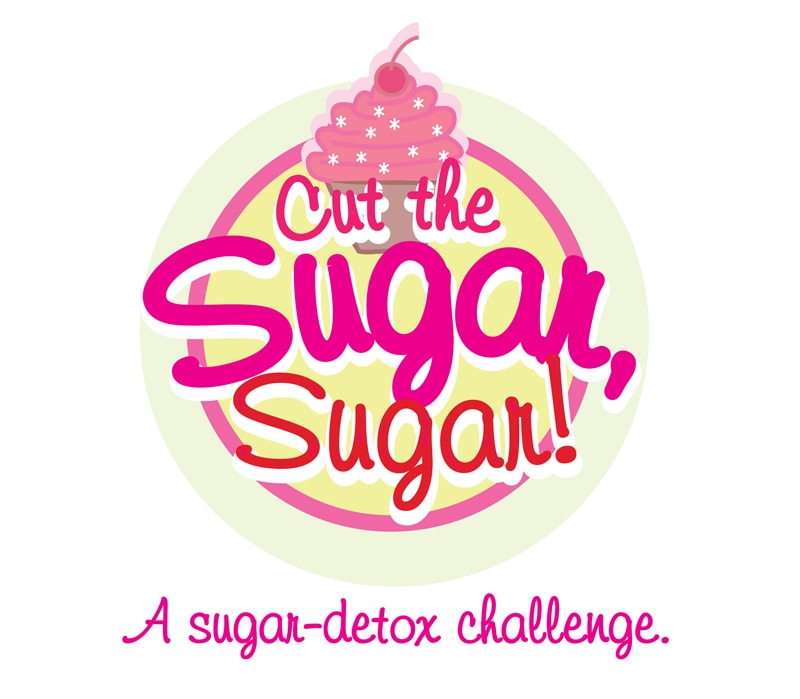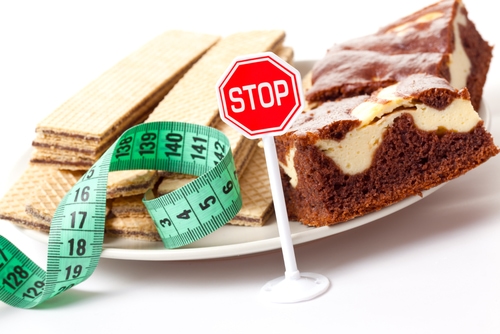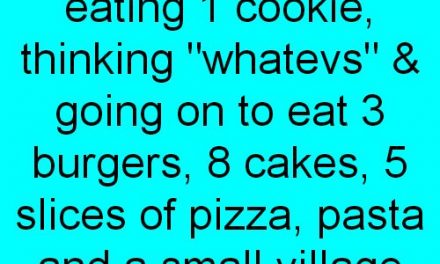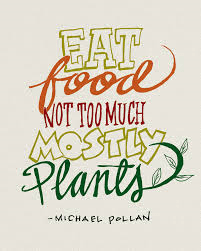Unnecessary, and even potentially harmful. That’s my opinion of sugar detoxes.
This isn’t a new fad but seems to be making a huge comeback. The promised benefits from a sugar detox include losing weight, higher energy, better sense of well-being, and more. Who wouldn’t be tempted by that, right?
But as we’ve covered before, I think you should avoid detoxes and cleanses, and sugar is no different.
The hosts of the Today show recently endured a 10 day sugar detox, and viewers likely joined them in the sugarless adventure. While some people champion the benefits from abstaining entirely from added sugar, I believe there are seven great reasons why you should NOT do a sugar detox.
1) Can actually lead to weight gain.
This one is going to confuse people because one of the main reasons to do a sugar detox is to lose weight.
Hoda Kotb, host of the Today show, said during her sugar detox, “I’ve gained two pounds since I’ve been on it” because she kept reaching for things like potato chips to satisfy her sugar craving she couldn’t fill. “I’m eating stuff I don’t really like” and “I had two cough drops before the show, because they tasted sweet” she went on to say openly about some of the not-so-great effects from the detox.
She later asked her co-host Kathie Lee, “Why am I gaining weight? Why?” The answer is simple. Because she wasn’t “allowed” to eat anything with added sugar, she was reaching for other high calorie foods to satisfy her craving. And since she gained two pounds it’s likely due to water retention (from all the salt) and/or because she was eating more than she did prior to the sugar detox.
This isn’t uncommon and I’ve seen it happen with other people who go on a sugar detox, or avoid any other food group entirely. We fill a craving for the things we can’t have with whatever else is available, even if we don’t really want/like it. Sometimes this means we eat more food than we were previously.
Once upon a time I attempted to avoid added sugar, and that meant saying an emotional good-bye to my spoonful of sugar I put in my coffee. I experienced the same thing Hoda did – I found myself eating much more of the foods I “could” have than I did before avoiding sugar. I finally realized, “I’m better off consuming 50 or so calories of pure sugar than an extra 300 or so calories from fat.” We’ll get to this in a moment, but next up …
 2) Can lead to binges and other disordered eating habits.
2) Can lead to binges and other disordered eating habits.
I can’t recall how many times someone told me they did a sugar detox and then the second it was over they ate copious amounts of sugar. It turns into a no holds barred sugar binge that’s typically justified by statements such as, “I didn’t eat sugar for X number of days, so I deserve this!”
It’s been my personal experience and from working with clients that eliminating entire foods or food groups (and sugar, in this case) can lead to, or increase existing, disordered eating habits as well, and it’s a huge reason why I’m not a fan of detoxes of any kind. It makes no sense to eliminate sugar for 10 days just to eat 10 days worth of sugar the moment the detox is over.
3) Can lead to a “damage control” mentality.
Many who attempt a sugar detox inevitably slip up at least once, and that often leads to them feeling like a failure. In a desperate attempt to “undo the damage” from the slip up they go into damage control mode and either vow to restrict more or endure the detox for a longer period of time, or they try to remedy the situation with an extra or more challenging workout.
Once again, this is negative reinforcement and only leads to more trouble and is another reason to avoid sugar detoxes.
4) For most people it’s not sustainable long-term.
While some people may glean information from a sugar detox about how much excess sugar they eat on a daily basis, it’s not practical for most people to avoid added sugar long-term because, let’s face it, there are some super delicious foods made with sugar!
Ice cream. A freshly baked pastry. Chocolate dipped fruit. Sugar in your morning coffee. I could go on and on, but you get the point.
Abstaining from sugar long-term is impractical, and therefore attempting to do so is a waste of time and could have negative consequences, as discussed here. If something doesn’t create a sustainable, long-term habit, why even waste your time or put yourself through the frustration? Avoiding sugar long-term is not going to happen for most people, so doing it for 7-10 days isn’t necessary.
5) Sugar is not evil and is not the sole contributor to fat gain.
Calories matter when it comes to losing or gaining fat. Despite what some would have you believe, eliminating sugar does not magically make you lose fat.
If you recall, a professor of human nutrition ate mostly sugary, processed foods (e.g. snack cakes, chips, cookies, sugary cereals) for two months. He maintained a caloric deficit (this is important!) and lost 27 pounds and improved his cholesterol. Keep in mind he wasn’t doing this to say this is how people should eat, but rather to show the importance of overall calories, regardless of the main source.
So if you were eating 2,000 calories before your sugar detox and starting eating 2,300 calories during your sugar detox (perhaps because you were eating other foods you typically didn’t in an effort to satisfy a craving) then you’re likely going to gain weight. It’s simple math. (Note: Can eating too much refined sugar cause health problems? Of course. Eating too much of anything can have consequences, but right now we’re talking strictly about fat loss and gain.)
This is also why some people do lose weight during a sugar detox because they’re eating fewer total calories since they removed foods from their daily eating habits. For more information regarding the truth about sugar, I’ll refer you to the brilliant Alan Aragon because when it comes to the science behind sugar, he’s much more qualified than I am.
 6) A sugar detox is not necessary to jump-start a healthy lifestyle.
6) A sugar detox is not necessary to jump-start a healthy lifestyle.
Many people embark on a sugar detox to kick-off a healthier lifestyle and better eating habits.
I think it does the exact opposite.
Having to abstain from something entirely usually isn’t fun, and I’ll bet you know from personal experience. Did you ever avoid sugar or some other food group for a period of time? Remember how miserable it was? Remember impatiently waiting for it to be over? Doing something difficult, stressful, and impractical in an effort to jump-start a healthier lifestyle is entirely counterproductive and should be avoided.
If you want to experience a simple, stress free way to “jump-start” your routine, try a 12 week Nutrition and Exercise program with us at Trench. The goal should always be to adopt new, simple habits you can sustain long-term, not to suffer through a 10 day detox that will end with you diving face first into a gallon of ice cream or funneling sugar like you’re at a frat party (Go! Go! Go!).
7) Most people do a sugar detox because they want to lose weight – forget about weight loss. Be MORE.
Women are constantly compelled to focus on how they look. We feel obligated to look a certain way and are encouraged to attain that look by any means necessary. Many women are always on some sort of diet or doing the latest detox. It’s time to reject this diet-constantly mentality and choose to be MORE.
Don’t Detox, but Do Be Aware
Sugar is not evil and you don’t need to avoid it entirely (unless told otherwise by your physician) nor should you eat it in copious amounts throwing caution to the wind. As in many cases, moderation is the key. When it comes to including added sugar in your diet, my rule of thumb is simple: eat the things you truly enjoy, and eliminate the things you don’t. Let’s break down both parts of that sentence. (Please note I’m referring to added sugar and not naturally occurring sugars in fruits and other whole foods).
Eat the things you truly enjoy. For example, my main sources of added sugar are a spoonful of raw sugar in my morning coffee and the occasional bowl of ice cream. I very much enjoy my morning cup of coffee, and it wouldn’t be the same without sugar. This is not an option because if I excluded sugar my coffee just wouldn’t be the same enjoyable experience, and I know I’d be reaching for something else to satisfy that craving later in the day that would likely be higher in calories than a simple spoonful of sugar.
Second, my favorite dessert is ice cream, and I enjoy it guilt-free when I truly crave it, which is maybe once a week or so. I also enjoy special foods when traveling that I can’t get at home such as pastries, homemade caramels or chocolates, or other baked goods.
You should do the same: eat the things you enjoy most, and that brings us to the second part. Eliminate the things you don’t truly enjoy. If you consume excess sugar from fruit juice or other snacks you randomly include throughout the day but don’t truly enjoy them, cut back or eliminate those things.
A helpful way to view this is to think about having an allowance. If you only have $20 to spend per day, you’re going to put some thought in what you buy and (hopefully) not blow it all on the first thing you see. You’ll ask questions like, “Will I enjoy this? Is it worth it?” and make a conscious decision. You can approach what you choose to eat that includes added sugars in the same way. Don’t guzzle down a large soda when you know you’d enjoy a couple scoops of ice cream much more.
Furthermore, choose your battles. Don’t obsess over something like a spoonful of sugar in your coffee is that is something you truly enjoy. Focus on the BIG things that matter more – the bare essentials – and save yourself the unnecessary stress and frustration. Forget about detoxing and be mindful of what you eat. All you need to do are follow a few simple guidelines that you can apply long-term.
With Love from the Trench Kitchen,
xoxoErika♥










